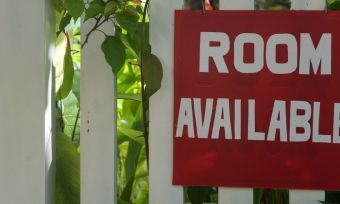Home insurance is an essential part of being a homeowner. A home is a huge investment, and is key to providing not only a place to live, but also building equity and a secure financial future.
Should the worst happen, and you lose your home, you need to know you have adequate insurance to fall back on. And part of being properly insured means understanding any clauses, conditions and exclusions that could leave you facing a rejected claim.
One of the major clauses covers being insured for an unoccupied home.
In this article
Does insurance cover you if your home is unoccupied?
What happens if your home is considered unoccupied?
Inform your insurer
Can you keep your house ‘occupied’?
Unoccupied home insurance policies
Does insurance cover you if your home is unoccupied?
To answer this quickly – maybe.
There are a few factors to consider, starting with your insurer’s definition of unoccupied. If you go away for a couple of weeks, and your house is sitting empty, it’s unlikely your insurer is going to claim you left your house unoccupied and withhold a payout.
But leave your home unoccupied for too long and, at some point, they might.
Generally, a house is considered unoccupied if it’s vacant for 60 days or more. But you should always double-check this with your insurer. At this point, there may be some changes to your cover. But anything less than around two months and you shouldn’t have to worry.
What happens if your home is considered unoccupied?
If you are away longer than 60 days, then some changes to your cover could kick in.
Typically, these could include:
- You not being covered for any loss unless you inform your insurer and they agree to cover you
- Cover for limited losses (eg fire or natural disaster) unless you inform your insurer and they agree to cover you
- Your cover continuing, but an extra unoccupied excess being applied to any claim
All the above will likely include several conditions and clauses. So be sure to check your insurance policy documents, as these will not only list what will happen should your home be unoccupied, but they should list any conditions and/or clauses that need to be met.
Why your house is unoccupied
It’s worth noting that the reason for your house being unoccupied may affect the cover offered or the restrictions/clauses implemented.
For example, as long as your insurer is aware of the nature of your home when the policy is taken out, holiday homes are usually exempt from any unoccupied home clauses. So you shouldn’t be surprised by any extra excess or clauses limiting your cover.
Whatever the reason your property is sitting empty, it’s important you discuss it with your insurer.
→Related article: Home & Contents: What to do if Your House Floods
Inform your insurer
As mentioned above, if your home is going to sit unoccupied for longer than a couple of months, the most important thing you can do is to inform your insurer.
This is because, even if your policy provides cover for unoccupied homes, some insurers may not cover you at all if they are not informed the property is vacant.
Do be aware that when you inform your insurer, they may make some alterations to your cover.
These might include:
- Changes to your excess and/or premiums
- Additional conditions that need to be met (eg. keeping the yard maintained)
- Further restrictions on what your cover includes (eg. no cover for break-ins)
Can you keep your house occupied?
If possible, it may be worth taking the necessary steps to keep your house occupied in the eyes of your insurer. Ensuring you get away to your batch for at least a night every few months, or having someone intermittently house sit while you’re away, could avoid the hassle of your house falling into unoccupied territory.
It’s worth noting that different insurers have varying definitions of the term occupied.
For example, one insurer may stipulate that someone needs to spend at least one night there every 60 days. While another may simply state someone needs to ‘check in’ on the property. Some insurers simply state someone needs to be residing there, in which case you may need to ask for clarification on what this entails.
Make sure you know what is relevant for your property and policy. If you pop in for five minutes every few months, that might not be enough to satisfy your insurer.
Unoccupied home insurance policies
Ultimately, as long as you speak to your insurer, it’s likely that you can insure an unoccupied home without issue. You might just need to meet a few extra conditions, or pay a little more.
Below we’ve provided a brief overview of each insurer’s policy on home insurance for unoccupied homes. For more information, be sure to visit each insurer’s website:
- AA Insurance – an additional ‘unoccupied excess’ is charged for any claims made
- AMI – insured for limited cover unless AMI has been notified home is unoccupied and agreed to continue full cover. Policy terms are subject to change at this point
- AMP – not insured for any loss unless AMP has been notified home is unoccupied and agreed to continue cover. Policy terms are subject to change at this point
- ANZ – not insured for any loss unless ANZ has been notified home is unoccupied and agreed to continue cover. Policy terms are subject to change at this point
- ASB – insured for limited cover unless Westpac has been notified home is unoccupied and agreed to continue full cover. Policy terms are subject to change at this point
- BNZ – insured for limited cover unless BNZ has been notified home is unoccupied and agreed to continue full cover. Policy terms are subject to change at this point
- FMG – not insured for any loss unless FMG has been notified home is unoccupied and agreed to continue cover. Policy terms are subject to change at this point
- NZI – insured for limited cover unless NZI has been notified home is unoccupied and agreed to continue full cover. Policy terms are subject to change at this point
- State – insured for limited cover unless State has been notified home is unoccupied and agreed to continue full cover. Policy terms are subject to change at this point
- Tower – applies an additional $1000 excess (holiday homes exempt)
- Vero – not insured for any loss unless Vero has been notified home is unoccupied and agreed to continue cover. Policy terms are subject to change at this point
- Westpac – insured for limited cover unless Westpac has been notified home is unoccupied and agreed to continue full cover. Policy terms are subject to change at this point
→Related article: How Much Contents Insurance Do I Need?

About the author of this page
This report was written by Canstar Content Producer, Andrew Broadley. Andrew is an experienced writer with a wide range of industry experience. Starting out, he cut his teeth working as a writer for print and online magazines, and he has worked in both journalism and editorial roles. His content has covered lifestyle and culture, marketing and, more recently, finance for Canstar.
Enjoy reading this article?
You can like us on Facebook and get social, or sign up to receive more news like this straight to your inbox.
By subscribing you agree to the Canstar Privacy Policy







Share this article